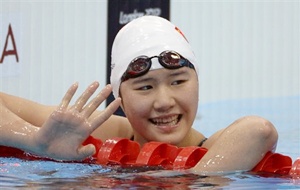The International Olympic Committee (IOC) hinted on Tuesday that gold medallist swimmer Ye Shiwen of China had not tested positive for any drugs as the doping controversy triggered by her sensational performances refused to abate.
The 16-year-old Ye won the women's 400 individual medley in World record time, with her final length of the freestyle faster than men's champion Ryan Lochte.
 She was also the fastest qualifier for the 200 individual medley final later on Tuesday, setting an Olympic record in qualifying.
She was also the fastest qualifier for the 200 individual medley final later on Tuesday, setting an Olympic record in qualifying.
Asked whether Ye's doping test following her first victory at the Games had come in positive or negative, IOC spokesman Mark Adams said: "We would only comment if we had any adverse finding.
"I am not commenting, so you can draw your own conclusions."
The top-five athletes in all events are undergoing drugs tests following their competitions as well as two more from the final line-up as the IOC seeks to root out cheats who have tarnished past editions of the multi-billion event.
"I think we need to get real here," Adams said. "These are the world's best athletes competing at the highest level."
"We have a very, very strong drugs testing programme," he said. "If there are cheats we will catch them."
The Chinese swimmer has also brushed aside doping speculations saying her country's athletes had "clean hands" despite a chequered doping past.
"You cannot stop speculation," Adams said. "It is something that people talk about. It is a sad result of the fact that there are people who cheat. If you cannot applaud a good performance let's give the benefit of the doubt."
The IOC will run more than 5,000 tests at the July 27-August 12 Games and so far two athletes were suspended from the Games for banned substances while one was temporarily banned pending a B sample test.
Photograph: Mark J. Terrill/ AP Photo








 © 2024 Rediff.com -
© 2024 Rediff.com -